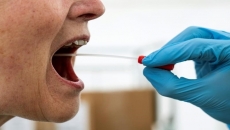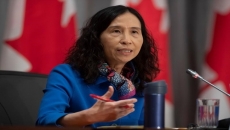Deputy Prime Minister Chrystia Freeland says Canada and the U.S. are working on plans to deal with what she calls an inevitable increase in cross-border traffic as economies in both countries emerge from their pandemic-induced comas.
Freeland says traffic over the shared border is bound to increase as states and provinces reopen shuttered businesses and ease restrictions on personal mobility, even if the current Canada-U.S. ban on non-essential travel remains unchanged.
That agreement, which has allowed essential workers and trade shipments to continue to move back and forth between the two countries, was first imposed in March and is set to expire on May 21.
Freeland says discussions about when and how to begin easing those restrictions are ongoing, both between Canada and the U.S. and between the federal government and the provinces.
She says Canada will adhere to the same prudent and sensible approach that has guided it throughout the COVID-19 outbreak. And she says the premiers "by and large" share the same cautious view as the federal government.
"Inevitably, as our economies start to open up ... even absent a single change in Canada's border restrictions, we will see more travel across the border — we'll see more Canadians choosing to go back and forth, and we'll see more business activity, which will mean more essential travel," Freeland said.
"That does mean that the federal government will need to do even more at all of our borders to keep Canadians safe and well, and that is something that we are working on right now, and we're very focused on."
On Friday, Ontario Premier Doug Ford made crystal clear how he feels about the prospect of allowing visitors to Ontario from the U.S., where COVID-19 has exacted a brutal toll: more than a million active cases and 81,000 deaths to date.
"I do not want those borders open," Ford said, noting that his counterparts in Quebec and B.C. feel the same way. Screening at airports and border crossings will need to increase "tenfold" once the restrictions are lifted, he added.






